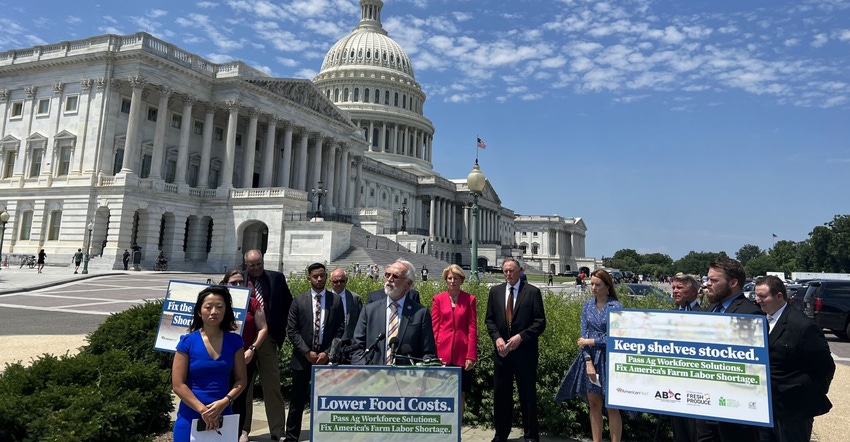
A new analysis from Texas A&M shows an increase in H-2A work visas decreases inflation and unemployment and increases wages and GDP. While speaking in front of the Capitol building at a press conference July 12, Rep. Dan Newhouse, R-Wash., says Congress has a solution today to do exactly that in urging the Senate to pass the Farm Workforce Modernization Act.
“By ensuring a legal and reliable agricultural workforce, we can secure our food supply, strengthening our national security and averting disaster, reduce food costs for all Americans, and raise wages and reduce unemployment for all American workers by creating value-added, upstream jobs for Americans,” says Newhouse, adding it isn’t just rhetoric but backed by the new data from Texas A&M.
Newhouse hosted a press conference with the American Business Immigration Coalition Action, National Council of Farmer Cooperatives, the International Fresh Produce Association, AmericanHort, and the National Council of Agricultural Employers to urge the Senate to pass the bill which has stalled after its passage in the House.
The Farm Workforce Modernization Act, which passed the House for the second time in March 2021, creates a workforce solution for America’s agriculture industry. The House-approved bill would establish a program for agricultural workers in the United States to earn legal status through continued agricultural employment and contribution to the U.S. agricultural economy.
It also reforms the H-2A program to provide more flexibility for employers, while ensuring critical protections for workers. The bill focuses on modifications to make the program more responsive and user-friendly for employers and provides access to the program for industries with year-round labor needs. In addition, it establishes mandatory, nationwide E-Verify system for all agricultural employment with a structured phase-in and guaranteed due process for authorized workers who are incorrectly rejected by the system.
“For the past decade or so, I have had the privilege of bringing a wide range of agriculture groups together to work on a solution to the ag labor crisis in a united effort,” says Chuck Conner, president and CEO of NCFC, at the news conference. “Yet, it’s the events of the past few years, from the COVID-19 pandemic to the war in Ukraine, that have highlighted for me a fact that often gets overlooked in this debate—our national security is tied to our ability to feed ourselves, and that ability is currently under threat from the ag labor crisis.”
Rep. Mike Simpson, R-Idaho, says he’s “living proof that you can actually go out and talk about immigration and win an election.” As he visits with farmers, the labor shortage is the No. 1 issue he hears and says it is the “most important thing we can do for agriculture” in passing the bill.
The event was meant to rally support for the efforts of Sens. Mike Crapo, R-Idaho, and Michael Bennet, D-Colo., to introduce a Senate bill that builds on FWMA.
Conner says action is critical for another reason as it relates to the need to advance the ag labor bill.
“Next year, Congress will be writing the 2023 Farm Bill. If the past is any guide, it will include dozens of programs critical to ensuring food security, from crop insurance to conservation, from research to nutrition. But, without action, hanging over the process will be one issue—ag labor—that threatens to undermine every program in that legislation. Quite simply, America’s farmers, ranchers, growers and co-ops cannot survive, let alone thrive, without a workforce.
“That is why this effort by Senators Crapo and Bennett—and subsequent Senate action—is so important,” Conner says. “It will address a growing crisis, enhance this country’s food security, provide the foundation for the success of the next farm bill, and provide a measure of certainty for producers at a time of great uncertainty.”
Read more about:
LaborAbout the Author(s)
You May Also Like






